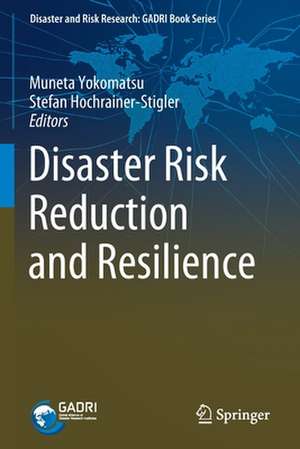Disaster Risk Reduction and Resilience: Disaster and Risk Research: GADRI Book Series
Editat de Muneta Yokomatsu, Stefan Hochrainer-Stigleren Limba Engleză Paperback – 2 iul 2021
| Toate formatele și edițiile | Preț | Express |
|---|---|---|
| Paperback (1) | 996.46 lei 6-8 săpt. | |
| Springer Nature Singapore – 2 iul 2021 | 996.46 lei 6-8 săpt. | |
| Hardback (1) | 1002.44 lei 6-8 săpt. | |
| Springer Nature Singapore – 2 iul 2020 | 1002.44 lei 6-8 săpt. |
Preț: 996.46 lei
Preț vechi: 1215.20 lei
-18% Nou
Puncte Express: 1495
Preț estimativ în valută:
190.68€ • 203.90$ • 158.98£
190.68€ • 203.90$ • 158.98£
Carte tipărită la comandă
Livrare economică 17 aprilie-01 mai
Preluare comenzi: 021 569.72.76
Specificații
ISBN-13: 9789811543227
ISBN-10: 9811543224
Pagini: 236
Ilustrații: VI, 236 p. 38 illus., 27 illus. in color.
Dimensiuni: 155 x 235 mm
Greutate: 0.35 kg
Ediția:1st ed. 2020
Editura: Springer Nature Singapore
Colecția Springer
Seria Disaster and Risk Research: GADRI Book Series
Locul publicării:Singapore, Singapore
ISBN-10: 9811543224
Pagini: 236
Ilustrații: VI, 236 p. 38 illus., 27 illus. in color.
Dimensiuni: 155 x 235 mm
Greutate: 0.35 kg
Ediția:1st ed. 2020
Editura: Springer Nature Singapore
Colecția Springer
Seria Disaster and Risk Research: GADRI Book Series
Locul publicării:Singapore, Singapore
Cuprins
Introduction.- Recognition of Earthquake-Prone Areas for Seismic Hazard Evaluation.- Resilience to volcano- and landslide-related hazards.- Towards Natech Resilient Industries.- Resilience and electricity.- Disaster risk and a household’s dynamic asset-formation behavior: Jump control model of household.- Exploring drought resilience through a drought risk management lens in Austria.- Social Psychological Perspectives on Preparedness Theory and Practice: Facilitating Resilience.- Measuring and building community disaster resilience: essential for achieving Sendai.- Building the Evidence Base to Achieve the Sendai Framework for DRR Goals.- Fiscal resilience and building back better: A global analysis for disaster risk reduction strategies.- Discussion and Outlook for the Future.
Notă biografică
Muneta Yokomatsu is an associate professor of the Disaster Prevention Research Institute (DPRI), Kyoto University, and a guest research scholar with the Risk and Resilience (RISK) program at the International Institute for Applied Systems Analysis (IIASA). He is a treasurer of the Integrated Disaster Risk Management (IDRiM) Society, and an editor in chief of the Journal of Natural Disaster Science (JNDS).
Stefan Hochrainer-Stigler is a senior research scholar with the Risk and Resilience (RISK) program at the International Institute for Applied Systems Analysis (IIASA), and leader of the Risk Analysis and Modeling Group. A member of the Board of Directors of the Integrated Disaster Risk Management (IDRiM) Society and the Board of Directors of the Global Alliance of Disaster Research Institutes (GADRI), he is also a lecturer at the University of Vienna, the Karlsruhe Institute of Technology, and the Graduate School at the Institute for Advanced Study in Pavia.
Textul de pe ultima copertă
This book provides insight on how disaster risk management can increase the resilience of society to various natural hazards. The multi-dimensionality of resilience and the various different perspectives in regards to disaster risk reduction are taken explicitly into account by providing studies and approaches on different scales and ranging from natural science based methods to social science frameworks. For all chapters, special emphasis is placed on implementation aspects and specifically in regards to the targets and priorities for action laid out in the Sendai Framework for Disaster Risk Reduction. The chapters provide also a starting point for interested readers on specific issues of resilience and therefore include extensive reference material and important future directions for research.
Caracteristici
Focuses on disaster risk reduction from a multidisciplinary resilience perspective Includes discussions of how diverse topics are connected with goals identified by the Sendai Framework 2015–2030 Addresses resilience to various natural hazards including flood, wind, earthquake, volcano, landslide, and Natech types



